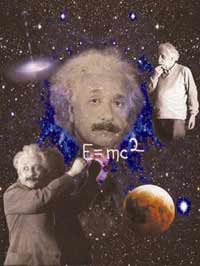'Einstein's stupid mistake'
According to Albert Einstein's 'experience', the greatest scientist of the twentieth century, if he wanted to become a celebrity, how should he speak and write so that no one could understand.

Albert Einstein with his genius invention in Relativity describes the relationship between energy (E) and mass (m) and speed of light (c)
This idea was made in 2005, on the 100th anniversary of the invention of Relativity (1905-2005).
When Albert Einstein's theory of relativity was just published, only a few people understood that theory. But the author of the whole world knows the name.
So far, after 100 years of releasing the theory of relativity, scientific progress has been far from the time of 1905, but the number of people who understand this scientific theory is only counted on the fingertips.
But in England and the United States, when asked 'Who do you like to clone first?', Albert Einstein was the top-ranked list, then other outstanding celebrities in the fields of science and politics. and art.
Also in 2005, scientists were under the project of 'Supernova Legacy Survey', just published the results of the study of stars appearing 2 to 8 billion years away from us. light and discovering an extremely interesting thing, proving Albert Einstein and his theory of relativity is not only difficult to understand but also hidden many mysteries about this scientist's strange genius.
The story is, when building the Theory of Relativity, Albert Einstein found a mathematical equation that describes the harmonious balance of the universe, which contains a constant, which he calls the cosmological constant.
According to Albert Einstein, the universe is a harmonious, unified system, and he intends to build a scientific treatise that can describe all phenomena in nature.
Albert Einstein called it a unified field theory. But later, astronomical observations showed that the universe was expanding with increasing speed and no balance. So Albert Einstein decided to take the cosmological constant out of the mathematical equation he invented himself.
In the 1990s, long after Albert Einstein's death, the researchers found that in the universe there is black energy, a type of antigravity that acts to propel matter.
Thus, things in nature not only 'attract' each other by the gravitational force but also push each other. It is from this discovery that scientists hope to explain the accelerated expansion phenomenon of the universe. But what is black energy, so far no one has given a precise definition.
One theory is that it exists in the form of special particles. And the scientists participating in the project confirmed that black energy is very similar to the cosmological constant, exists everywhere in space and in time.
The observations of scientists working at many telescopes arranged in different countries around the world allow detecting explosions from supernovae a few billion light years away.
By measuring the distance, brightness, and spectrum of such stars, astronomers confirm that the impact of black energy does not change when increasing the distance to any object in the universe.
When scientists bring the data about black energy attached to the state equation that describes the relationship between pressure and material density in the universe, they discover that the black energy is described below. The form of a constant constant equal to the cosmological constant of Albert Einstein!
Excited and excited by the unexpected research results, astronomers working on the project plan to continue measuring for a while to improve the accuracy of the measurements in the hope of bringing the negative constant black energy approaching near the cosmological constant of Albert Einstein.
From here, the scientists found that Albert Einstein's original mathematical equation contained a curious genius prediction that he himself did not believe in the idea.
Thus, Albert Einstein himself, not anyone else, nearly 100 years ago, by mathematical methods, described the existence of black energy as a quantity he called the cosmological constant.
Interestingly, nearly 100 years ago, when he removed the cosmological constant from his own mathematical equation, Albert Einstein called it the "stupidest mistake" in his life!
Unexpectedly, nearly 100 years later, it was that 'stupidest mistake' of Albert Einstein that predicted the most genius and mystery in all the scientific history of mankind.
Le Minh
- Smart men are also stupid
- Eating a lot of fat makes you stupid and lazy
- Pigs are really very stupid?
- Scientific research confirms that men are more
- Discovering a virus that can make people stupid
- Mission of lilies
- Lung cancer: easy to make another mistake
- The biggest mistake of men when shaving
- A student pointed out a mistake in NASA data
- Mistake when using toilet paper so many people suffer without knowing
- Boring work makes your brain go stupid
- dogs become stupid when living with hosts
 The most famous scientific failures in history
The most famous scientific failures in history Mysterious genius mechanic and the machine froze time
Mysterious genius mechanic and the machine froze time The son carries the 'bad gene' of genius Albert Einstein
The son carries the 'bad gene' of genius Albert Einstein Isaac Newton
Isaac Newton